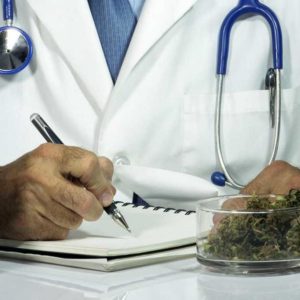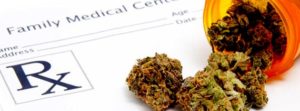With marijuana now more accessible than ever, more researchers are weighing in on its health effects. But that doesn’t mean we fully understand the plant or its impacts. The National Academies of Sciences, Engineering, and Medicine released a massive report in January that gives one of the most comprehensive looks and certainly the most up-to-date — at exactly what we know about the science of cannabis. The committee behind the report, representing top universities around the country, considered more than 10,000 studies for its analysis and drew nearly 100 conclusions. Many of those findings are summarized below. Within a few minutes of inhaling marijuana, your heart rate can increase by between 20 and 50 beats a minute. This can last anywhere from 20 minutes to three hours, according to the National Institute on Drug Abuse. The report from the National Academies found insufficient evidence to support or refute the idea that cannabis might increase the overall risk of a heart attack. The same report, however, also found some limited evidence that smoking could be a trigger for a heart attack. In August, a study published in the European Journal of Preventive Cardiology appeared to suggest that marijuana smokers face a threefold higher risk of dying from high blood pressure than people who have never smoked. Research suggests this is a poor assumption — and one that could have interfered with the study’s results. According to a recent survey, about 52% of Americans have tried cannabis at some point, yet only 14% used the drug at least once a month. Other studies have come to the opposite conclusion. According to the Mayo Clinic, using cannabis could result in decreased— not increased — blood pressure. So while there’s probably a link between smoking marijuana and high blood pressure, there’s not enough research yet to say that one leads to the other. Marijuana contains cannabidiol, or CBD, a chemical that is not responsible for getting you high but is thought to be responsible for many of marijuana’s therapeutic effects. Those benefits can include pain relief or potential treatment for certain kinds of childhood epilepsy. The report from the National Academies also found conclusive or substantial evidence the most definitive levels — that cannabis can be an effective treatment for chronic pain, which could have to do with both CBD and THC, the psychoactive ingredient in marijuana. Pain is “by far the most common” reason people request medical marijuana, according to the report. In September, a study published in the Journal of American Medical Directors Association seemed to suggest that marijuana might actually prevent people from graduating to hard drugs. The five-year-long study involved 125 participants, all of whom endured chronic pain. Researchers found that one-third of participants who used marijuana to treat their chronic pain stopped taking prescribed medications. They suggested that legal access to cannabis might lower the use of dangerous prescription medications in certain patient populations. A study published in the journal Neuropsychopharmacology suggested that pot smokers could have a greatly reduced risk of stroke. Researchers from the University of Texas at Dallas found chronic cannabis users have higher blood flow to the brain and extract more oxygen from cerebral blood flow than nonusers. THC is known to relax blood vessels. A drug called Epidiolex, which contains CBD, may be on its way to becoming the first of its kind to win approval from the Food and Drug Administration for the treatment of childhood epilepsy that is now being used by many florida marijuana doctors. The company that makes it, GW Pharma, is exploring CBD for its potential use in people with Dravet syndrome, a rare, lifelong form of epilepsy that begins in infancy. Marijuana can mess with your memory by changing the way your brain processes information, but scientists still aren’t sure exactly how this happens. Still, several studies suggest that weed interferes with short-term memory, and researchers tend to see more of these effects in inexperienced or infrequent users than in heavy, frequent users. Unsurprisingly, these effects are most evident in the acute sense — immediately after use, when people are high. Scientists can’t say for sure whether marijuana causes depression, or depressed people are simply more likely to smoke says Florida marijuana doctors. But a 2011 study from the Netherlands suggested that smoking marijuana could raise the risk of depression for young people who already have a special serotonin gene that could make them more vulnerable to depression. The new report from the National Academies bolstered those findings. It found moderate evidence that cannabis use was linked to a small increased risk of depression. The new report from the National Academies also found substantial evidence of an increased risk among frequent marijuana users of developing schizophrenia something that studies have shown is a particular concern for people at risk for schizophrenia in the first place. Another study published in the Journal of Sexual Medicine showed that people who regularly use marijuana have more sex than abstainers.
The State of Florida including Tampa has legalized medical marijuana. The American public largely supports the legalization of medical marijuana. At large percentage of the public believes the drug should be legal for medical uses, and recreational pot usage is less controversial than ever, with at least 60 plus percent of Americans in support. Even though some medical benefits of smoking pot may be overstated by doctors and advocates of marijuana legalization, recent research has demonstrated that there are legitimate medical uses for marijuana and strong reasons to continue studying the drug’s medicinal uses.
Even the NIH’s National Institute on Drug Abuse lists medical uses for cannabis. There are at least two active chemicals in marijuana that researchers think have medicinal applications. Those are cannabidiol (CBD) which seems to impact the brain without a high— and tetrahydrocannabinol (THC) which has pain relieving properties and is largely responsible for the high. But scientists say that limitations on marijuana research mean we still have big questions about its medicinal properties. In addition to CBD and THC, there are another 400 or so chemical compounds, more than 60 of which are cannabinoids. Many of these could have medical uses. But without more research, we won’t know how to best make use of those compounds. More research would also shed light on the risks of marijuana. Even if there are legitimate uses for medicinal marijuana, that doesn’t mean all use is harmless. Some research indicates that chronic, heavy users may have impaired memory, learning, and processing speed, especially if they started regularly using marijuana before age 16 or 17.
That same report said there’s equally strong evidence provided by Doctors in Florida can help with muscle spasms related to multiple sclerosis. Other types of muscle spasms respond to marijuana as well. People use medical marijuana to treat diaphragm spasms that are not treatable by other, prescribed medications. There’s a fair amount of evidence that marijuana does no harm to the lungs, unless you also smoke tobacco. One study published in Journal of the American Medical Association found that not only does marijuana not impair lung function, it may even increase lung capacity. Researchers looking for risk factors of heart disease tested the lung function of 5,115 young adults over the course of 20 years. Tobacco smokers lost lung function over time, but pot users actually showed an increase in lung capacity. It’s possible that the increased lung capacity may be due to taking a deep breaths while inhaling the drug and not from a therapeutic chemical in the drug.

During the research for his documentary “Weed,” Sanjay Gupta interviewed the Figi family, who treated their 5-year-old daughter using a medical marijuana strain high in cannabidiol and low in THC. The Figi family’s daughter, Charlotte, has Dravet Syndrome, which causes seizures and severe developmental delays. According to the film, the drug decreased her seizures from 300 a week to just one every seven days. Forty other children in the state were using the same strain of marijuana to treat their seizures when the film was made and it seemed to be working. The doctors who recommended this treatment said the cannabidiol in the plant interacts with brain cells to quiet the excessive activity in the brain that causes these seizures. Gupta notes, however, that a hospital that specializes in the disorder, the American Academy of Pediatrics, and the Drug Enforcement agency don’t endorse marijuana as a treatment for Dravet or other seizure disorders. CBD may help prevent cancer from spreading, researchers in California said in mid 2000’s. Other very preliminary studies on aggressive brain tumors in mice or cell cultures have shown that THC and CBD can slow or shrink tumors at the right dose, which is a strong reason to do more research. One 2014 study found that marijuana can significantly slow the growth of the type of brain tumor associated with 80% of malignant brain cancer in people. Still, these findings in cell cultures and animals don’t necessarily mean the effect will translate to people — far more investigation is needed. Researchers know that many cannabis users consume marijuana to relax, but also that many people say smoking too much can cause anxiety. So scientists conducted a study to find the “hybrid” zone: the right amount of marijuana to calm people.

If you’re new to cannabis-based medicine, trying to figure out the best medical cannabis product to treat your condition can be downright confusing. In some states, product names range from humorous to downright awful , but how does a patient determine what strain or product is best for them? Will Harlequin treat my inflammatory bowel disease? What is useful for chronic pain?
Most conventional pharmaceuticals that you may be familiar with are made up of a single active pharmaceutical ingredient, while marijuana is a highly complex plant with many dozens of active ingredients (known as cannabinoids and terpenes). This complexity is largely what enables cannabis to be so therapeutically versatile. Some might argue cannabis is Mother Nature’s medicine cabinet. But, cannabis’ myriad of natural ingredients — along with the dizzying varieties of strains and product names present challenges to most patients who are trying to find relief for their symptoms.
The fact is, there is no “one-size-fits-all” treatment. Because cannabis is natural and comprised of so many active ingredients, finding the best medical cannabis product and dosage for your particular condition often requires a bit of trial and error.
Step 1: Determine the Optimal Cannabis Chemical Profile Starting Point for Your Condition
Currently, the most important factor in finding the right treatment for your condition and the best way to ensure you are getting the same treatment every time is the ratio of the major cannabinoids THC (Δ9-tetrahydrocannabinol) and CBD (cannabidiol). While Vireo products still contain the other cannabinoids in the plants, dosing is mainly focused on THC and CBD which are the most-studied cannabinoids for treating disease. THC is the only cannabinoid responsible for the intoxication (“high”) associated with cannabis. If you’re choosing a THC-dominant medical cannabis product, our pharmacists will help you choose a level of THC in our products that will minimize the risks of side effects including intoxication and the risk of inadvertent over-medication. Also, it’s helpful to know that CBD can potentially eliminate many of the side effects commonly experienced with THC.
When examining your options, consider your condition. High CBD medical cannabis products are best for epilepsy. THC dominant products, on the other hand, are preferred by patients with chronic pain or who are undergoing palliative cancer care to help with the symptoms of nausea, vomiting, and low appetite. Medical cannabis is remarkably nuanced (each patient can benefit from very different ratios and very different doses for very different conditions). Our experienced pharmacists are a tremendous resource to help you find that optimal dose, stay at that optimal dose, and avoid side effects and complications.
Of course, don’t ignore personal preferences and your unique physiology. Are you new to cannabis? If so, you may want to start with a medical cannabis product recommended by a Florida marijuana doctor that is higher in CBD and lower in THC, or at least more balanced. If you’re suffering from a condition that may be more responsive to THC, you can always work your way up over time. Medical cannabis is a unique medical treatment in that the body develops tolerance to side effects faster than it does to the therapeutic benefits says lakeland marijuana specialist.
To find medical cannabis products that match your optimal cannabinoid ratio (THC to CBD), don’t put much stock in imprecise strain classifications like indica, sativa, and hybrid. These groupings can be misleading as (contrary to popular perception) they have little to no correlation to how much THC or CBD is in a product. If you have previous experience with marijuana, be sure to share that with your medical cannabis pharmacist tampa marijuana doctors. Based on many factors, most important of them being your input, they can help you find your ideal treatment, which may include more that one ratio.
Step 2: Choose a Delivery Method That Best Suits Your Condition, Needs, and Comfort
Next, let’s talk for a moment about medical cannabis product delivery methods: In other words, how you’ll actually take your cannabis medicine.
Though some may previously have interfaced with cannabis by smoking it in “flower” form, that’s not an option because of the potential for inconsistencies in both dosage and product orlando marijuana doctors. And, of course, smoking is a lung irritant, which runs its own potential risks.
Step 3: Prepare for a Bit of Trial and Error
While the complexity of cannabis means there’s no single medical cannabis product and intake method that’s best for every person and intake methods eliminate much of the trial-and-error typically associated with finding the right cannabis medicine says sarasota marijuana doctors. Nonetheless, as we mentioned before, everyone is different, and it may take a bit of trial-and-error to find the ideal cannabinoid ratio and intake method that works best for you. Don’t be discouraged if you don’t see as much relief as you might expect on the first go.
Whatever product and intake method you choose, we’d like to remind you of a simple phrase:
“Start low. Go slow.”
This means that we advise patients to start with a very low dose and wait enough time for the effects to take hold says fort lauderdale marijuana doctors. We understand that our patients are looking for immediate relief and we do our best to help them achieve that. However, it is preferred to underdose and increase until a patient feels the right effect, rather than rush ahead and cause both unwanted and unnecessary side effects. This safe approach to dosing is similar to many other traditional medications, and it will go a long way towards ensuring you get the safe, desired effects you’re looking for with cannabis medicine lake mary marijuana doctors. One of the most important aspects of medical cannabis when compared to other accepted treatments, especially those for pain, is that there has never been a record of a death caused by medical cannabis overdose.
Further Resources & Publications:
- Americans for Safe Access: State-by-State Legal Information and Forms for Recommending Cannabis
- Americans for Safe Access: Resources for Patients
- Americans for Safe Access: Becoming a State-Authorized Patient
- Project CBD: What Is The Endocannabinoid System
- Medscape: Endocannabinoids
- Healer.com: Cannabis Education
- Australian Government Department of Health: Health Professional Information & Education
- Government of Canada: Information for Health Care Professionals
- Amercian’s Marijuana Map


